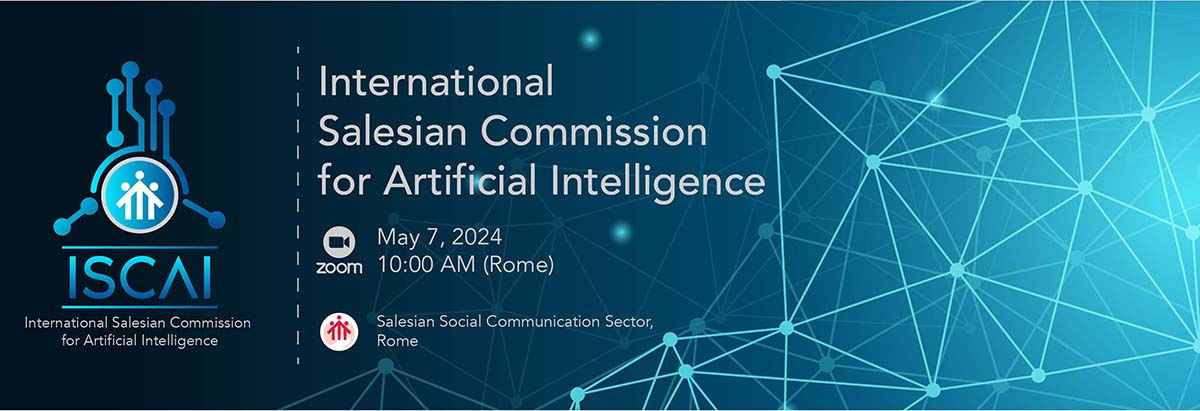(ZENIT News / Rome, 05.09.2024).- In order to answer to the mandate of the GC28 to respond creatively, courageously and educatively to the digital culture and the recent call of Pope Francis regarding the importance of artificial intelligence for the Church, the Sector of Salesian Social Communication has created an International Salesian Commission for Artificial Intelligence (ISCAI).
ISCAI has been set up in an effort to stay relevant to the signs of the times, to reap the benefits of the fast evolving AI technology and also to empower the Salesian family and its beneficiaries with knowledge of the tools and its ethical and moral implications.
The inaugural online meeting of ISCAI took place on May 7th 2024. Fr. Gildasio Mendes SDB, General Councillor for Social Communication and the Chairperson of ISCAI in his keynote address said that “the primary purpose of this commission is to reflect on Artificial Intelligence from an interdisciplinary perspective and provide guidelines for the Salesians and Educators working closely with the young.” He also went on to say that “the commission members were carefully chosen keeping in mind the larger vision of this body. There is at least one member representing each of the seven regions of the Salesian world. The initial team is a vibrant mix of Salesians and lay associates from both genders from different parts of the globe who are specialists in various aspects connected with the AI domain. There are professors, researchers, philosophers, creative professionals, computer experts and resource persons”. Fr. Mendes in his keynote address also highlighted the essential elements from the message of His Holiness Pope Francis for the 57th World Day of Peace titled “Artificial Intelligence and Peace”.
After the welcome and the keynote address the commission members briefly introduced themselves and presented about their areas of expertise and their creative pursuits in this field. Boldly embracing and putting to good use this evolving AI technology was the common theme that connected everyone’s thought pattern.
The commission is set explore;
– The potential of AI to enhance communication and education efforts
– The ethical implications of AI development and use
– The use of AI to promote social justice and care for the marginalized
The Commission Members:
– Fr Gildasio Mendes SDB, General Councillor for Social Communication
– Fr Ricardo Campoli SDB, Member of Social Communication Sector
– Fr Ernest Rosario SDB, Coordinator of ISCAI
– Hemerson Pistori (Brazil)
– Charo Fernandez (Madrid)
– Cristina del Aquila (Barcelona)
– Brendan Chua (USA)
– Esteban Inga Ortega (Ecuador)
– Fr Paul Dungca SDB (Philippines)
– Fr Arockia Selvakumar SDB (India)
– Fr Felix Olamide SDB (Nigeria)
– Fr John Paul Swaminathan SDB (France)
How can we interpret AI from a Salesian perspective? will be one of the core questions that will be steering this team towards research, innovation, discussions, deliberations, case studies and policy drafting.
In the context of the rapid acceleration of AI integration into every field some writers argue for a new ethics tailored to artificial intelligence. They also discuss how humans, nature, and technology interact on a global scale. This shows that digital issues are closely linked to human progress and environmental concerns.
Therefore, rather than just embracing a new era where technology solves all problems, the focus should be on humanizing the relationship between people and technology. This means caring for the environment, respecting human dignity and rights, revitalizing economy and politics, promoting global cooperation, and integrating technology responsibly, as advocated by Pope Francis in Laudato Si’ and the Global Education Pact.
Fr. Mendes said the next two meetings will be held on 5th September and 4th December 2024 respectively. The meeting came to a close with a call to be creative ambassadors promoting the positive use of evolving technologies such as AI for the betterment of all humankind and planet earth, our home.
With information from AIS.
Thank you for reading our content. If you would like to receive ZENIT’s daily e-mail news, you can subscribe for free through this link.




